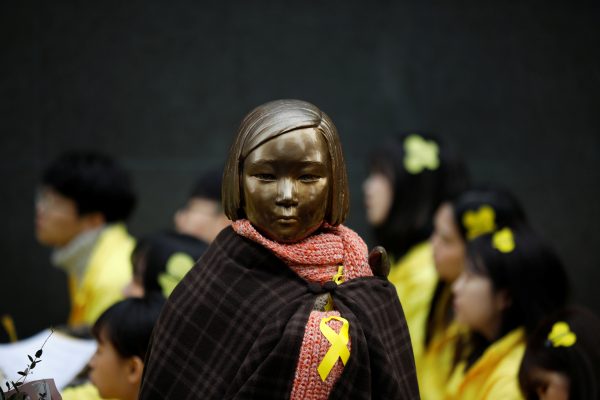One of Park Geun-hye’s foreign policy legacies was her forward strides in Seoul–Tokyo relations, particularly in relation to long-standing history problems. Yet these strides were only set in motion in the latter part of her term, which was cut short by her impeachment and subsequent dismissal.
How then will leadership change affect ROK–Japan relations? Given that Park’s policies vis-a-vis Tokyo have already shown signs of unravelling we can expect that the burden of history will again rear its head in the two countries’ relations.
In the first two years of Park’s presidency, ROK–Japan relations were fraught with tension. This stemmed primarily from the ‘comfort women’ issue, the most vexed among the various history problems plaguing their relations. Park ambitiously resolved to put this issue to rest. At the tail end of 2015, she and her Japanese counterpart Shinzo Abe enacted a ‘comfort women’ accord, and with that declared the matter settled ‘finally and irreversibly’.
This momentous accord seemed almost too good to be true. It effectively removed the ‘comfort women’ issue from the diplomatic agenda for most of 2016. It also paved the way for the long-pending passage of an intelligence-sharing agreement (the General Security of Military Information Agreement or GSOMIA), enacted by the two leaders in November 2016. These developments were met with high praise from then US president Obama. Indeed, the GSOMIA signified major progress towards Washington’s long-cherished goal: US–ROK–Japan trilateral security cooperation. To ensure that these positive advancements would continue, then US vice president Joseph Biden urged Abe to ‘steadily implement’ the ‘comfort women’ agreement with Seoul.
But there are reasons to doubt that the ‘comfort women’ deal will hold through South Korea’s leadership transition. For one, the accord was among Park’s most domestically unpopular foreign policy moves. It drew strong criticism from opposition leaders in South Korea as well as various civic groups advocating for ‘comfort women’ victims. This was because the terms of the accord were not in line with the victims’ redress demands. Appealing to these constituencies, Moon pledged to re-open the comfort women issue with Tokyo during his electoral campaign.
In fact, the accord has already begun to unravel. As predicted in an earlier piece, it was only a matter of time before the victims and their advocates pushed the ‘comfort women’ issue back onto the ROK–Japan diplomatic agenda. They achieved this in December 2016 by installing a ‘comfort women’ statue opposite the Japanese consulate in Busan. This was the second statue erected by activists in close proximity to a Japanese diplomatic mission in South Korea, the first being installed outside the Japanese embassy in Seoul in 2011.
One of the stipulations of the ‘comfort women’ accord was that the South Korean government would look into removing the Seoul-based statue. But it still stands and is unlikely to be moved. Japan’s foreign ministry perceives this and the newly-built Busan statue as violations of the accord and the Vienna Convention on diplomatic relations. Tokyo’s response was to recall its Japanese Ambassador and Consul-General to South Korea in protest. Evidently, the issue has yet to be resolved ‘finally and irreversibly’.
These statues will doubtlessly pose a significant diplomatic challenge for the newly elected Moon. This is all the more so given that former Korean forced labourers — who also seek redress from Tokyo — have just announced plans to establish their own statue in front of the Japanese Embassy in Seoul.
Yet it is unlikely that Moon will be able to completely renege on the comfort women accord. This is because it has already been partially implemented — some of the victims have received the funds provided by Tokyo. It is possible that the new president may attempt to add more terms to the accord, such as allowing the statues to remain standing. But that is something to which Tokyo is unlikely to accede.
The only factor that might stave off history-related tensions between the two countries in the short term is the escalation of the North Korean nuclear crisis. As Victor Cha has argued, when security threats in the region are high, Japan and South Korea are typically compelled to be more cooperative and temporarily put aside their history problems. That would be reinforced by their common US ally being engaged in a standoff against North Korea.
Lauren Richardson is Teaching Fellow in Japanese–Korean Relations and Politics at the University of Edinburgh.

